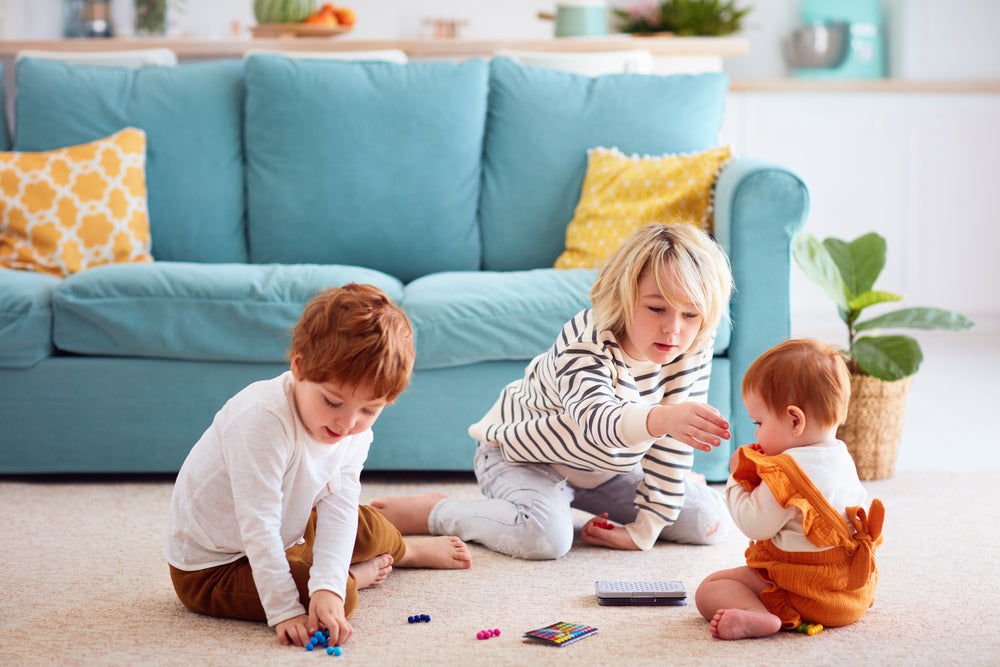Positive Language Strategies: Helping Your Child Navigate Challenges Independently


Bickering. Tattling. Sharing struggles. Most families notice an increase in this stuff during the back-to-school transition. If you feel like you’re constantly stepping in to help your child resolve conflicts, this one’s for you! From after school play dates to your family’s playroom, these Positive Language strategies will help your child navigate the tough stuff more independently:
Encourage children to speak directly to one another.
When it comes to supporting interactions between siblings or peers, modeling effective, respectful language is essential. Modeling language provides our children with the exact words or phrases they can use to communicate with others during challenging moments.
Examples:
“Tell him, ‘I’m still using this dump truck.’”
“Tell her, ‘I need more space, please.’”
Rely on sit-down chats, rather than separation.
Instead of immediately separating two children when conflict occurs:
- Sit on the floor together and say, “It seems like you both have different ideas about ________.”
- Give each child an opportunity to speak without interruption.
- Involve both children in the process of determining next steps.
*Afterwards, reflect on your involvement, “Could I have said or done less? Could they have said or done more?”
Take a step back when it comes to sharing.
Have you become the official timekeeper when it comes to sharing?
Instead of saying, “Give the green train to your sister in two minutes”
Encourage the child waiting for the toy to ask, “When will you be finished with the green train?”
You may need to offer two choices to the child using the toy-of-the-moment: “Would you like to share the green train before lunch or after lunch?”
Support the sibling that’s waiting for a turn by suggesting alternative toys/activities or offering empathy.
“You can build with blocks or read with me while you’re waiting.”
“It can feel really hard to wait sometimes.”
Let them experiment with different ways to play.
Instead of banning all forms of physical play, allow children to brainstorm different ways to move their bodies together- both indoors and outdoors.
Try saying, “It looks like you both need some Big Body Play Right now. What can you do together instead of throwing balls in the house?”
Help your child/children build a repertoire of safe, appropriate physical activities:
building with couch cushions
marching/dancing to upbeat music
creating/navigating obstacle courses
bouncing/jumping on mattresses
running in open spaces
tossing rolled up socks into a laundry basket
Give them time.
Children often come up with their own solutions when given the time and space to work through challenging situations together. Though it can be uncomfortable (and frustrating) to hear them struggle, challenge yourself to observe more and interrupt less. If/when you do offer support, emphasize collaborative problem solving and effective communication:
“I’ll be in the Living Room. I’m confident you can figure this out together.”
“Tell your brother what you WANT or NEED him to do, instead of what NOT to do.”
“Please find a different way to play together.”
For more language support, check out our Guide to Positive Language Strategies. We also offer a webinar on Positive Language Strategies to Support Sibling Interactions. In this webinar, we share practical tips to help your children communicate with clarity and respect- even when big feelings are involved! You’ll walk away with a new approach to sharing struggles, physical conflicts and sibling rivalry, as well as strategies to meet siblings’ individual needs.
Recent Articles
-
Playful Primer 10 Must-Have Toys for Your Next Backyard BBQ
Summer is just around the corner and we're ready for it! From backyard BBQs to neighborhood park outings, we've discovered...
read more -
Playful Primer Tips & Toys to Support Group Play Experiences
Catching a glimpse of children happily engaged in pretend play is like witnessing pure magic. Ever wonder how closely you...
read more -
Playful Primer 5 Ways to Strengthen the Bond Between Siblings
“I’ll take care of the bike. You take care of each other.” This is what I said to my children...
read more
